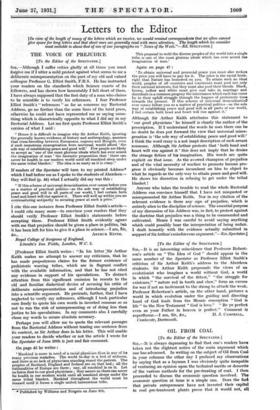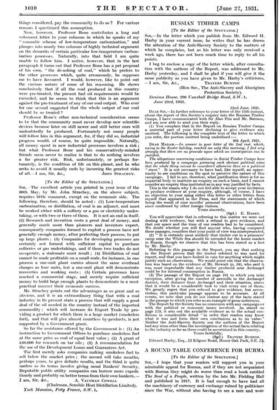OIL FROM COAL
[To the Editor of the SPECTATOR.]
Sin,—It is always depressing to find that one's readers have taken not the slightest notice of the main argument which one has advanced. In writing on the subject of Oil from Coal in your columns the other day I prefaced my observations by saying that as a layman I was obviously quite incapable of venturing an opinion upon the technical merits or demerits of the various methods for the pre-treating of coal. I then proceeded to discuss the economic question involved. The economic question at issue is a simple one. Does the fads that private entrepreneurs have not invested their capital in coal pre-treatment plants prove that it would not, all
things considered, pay the community to do so ? For various reasons I questioned this assumption.
Now, however, Professor Bone contributes a long and vehement letter to your columns in which he speaks of my " romantic scheme of low-temperature carbonization," and plunges into nearly two columns of highly technical argument on the demerits of certain particular low-temperature carbon- ization processes. Naturally, into that field I am quite unable to follow him. I notice, however, that in the last paragraph it turns out that Professor Bone has a pet proposal of his own, " the de-ashing of coal," which he prefers to the other processes which, quite erroneously, he supposes me to have favoured. I would, however, like to point out the curious nature of some of his reasoning. He shows conclusively that if all the coal produced in this country were pre-treated, the present fuel oil requirements would be exceeded, and he seems to think that this is an argument against the pre-treatment of any of our coal output. Who ever for one second suggested that the whole output of our coal should be so treated ?
Professor Bone's other non-technical consideration seems to be that the community must never develop new scientific devices because later on still newer and still better ones will undoubtedly be produced. Fortunately not many people will follow him in this argument, for, if they did so, industrial progress would, of course, be .quite impossible. Naturally, all money spent in new industrial processes involves a risk but what Professor Bone and his conservatively-minded friends seem never to realize is that to do nothing involves a far greater risk. Risk, unfortunately, or perhaps for- tunately, is the condition of life on this planet, and he who seeks to avoid it usually ends by incurring the greatest risks







































 Previous page
Previous page